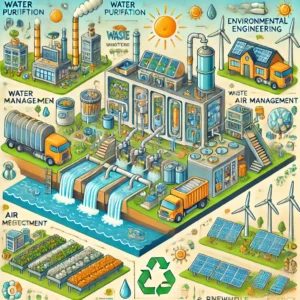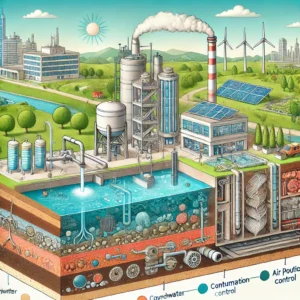.Here you can download the free lecture Notes of Environmental Engineering Notes Pdf – EE Pdf Notes materials with multiple file links to download. The Environmental Engineering Notes pdf – EE notes pdf book starts with the topics covering Waterborne -diseases – protected water supply, Comparison from quality and quantity and other considerations, Layout and general outline of water treatment units, working of slow and rapid gravity filters, types of layouts of Distribution systems, Layout and general outline of water treatment units, Conservancy and water carriage systems, Layout and general out line of various units, Construction and design of oxidation, ponds, Etc.

Environmental Engineering Note Pdf- EE Pdf Notes
Environmental Engineering Notes download links are listed below please check it-
Complete Notes
Link: Complete Notes
Unit 1
Link: Material 1 Notes
Unit 2
Link: Material 2 Notes
Unit 3
Link: Material 3 Notes
Unit 4
Link: Material 4 Notes
Note :– These notes are according to the R09 Syllabus book of JNTU. In R13 and R15,8-units of R09 syllabus are combined into 5-units in R13 and R15 syllabus. If you have any doubts please refer to the JNTU Syllabus Book.
Overview of Environmental Engineering Notes PDF
Environmental Engineering is a critical field that focuses on protecting human health and the environment by developing and implementing sustainable practices to manage water, air, and land resources. The Environmental Engineering Notes PDF provides a comprehensive guide for B.Tech students, covering essential topics as per the JNTU syllabus. These notes are designed to help students understand key concepts, principles, and practices in environmental engineering, aiding them in preparing for exams, assignments, and projects.
The Environmental Engineering Notes PDF includes detailed content on water supply systems, water and wastewater treatment processes, sewage disposal, and the management of environmental pollution. The notes are structured to align with the JNTU syllabus, making them an invaluable resource for B.Tech students. These notes are available for free download and are presented in a manner that is easy to understand, making complex topics accessible to all students.
Topics Covered in Environmental Engineering Notes

The Environmental Engineering Notes PDF covers a wide range of topics critical to understanding the field. Below is an outline of the key topics covered in the notes:
UNIT I: Introduction to Environmental Engineering
- Waterborne Diseases and Protected Water Supply: Understanding waterborne diseases, their impact on public health, and methods to provide a protected water supply.
- Population Forecasts and Design Period: Techniques for forecasting population growth and determining the design period for water supply systems.
- Water Demand and Types of Demand: Different types of water demand (domestic, commercial, industrial, fire, etc.) and factors affecting water consumption.
- Fluctuations in Water Demand: Causes and effects of fluctuations in water demand, including seasonal variations and peak demand considerations.
- Storage Capacity and Water Quality Testing: Methods for determining storage capacity requirements and standards for drinking water quality and testing.
UNIT II: Sources of Water
- Surface Water and Groundwater Sources: Overview of surface water sources (rivers, lakes, reservoirs) and groundwater sources (wells, aquifers).
- Comparison of Water Sources: Evaluation of different water sources based on quality, quantity, and other considerations.
- Water Intakes and Infiltration Galleries: Design and construction of water intakes and infiltration galleries for collecting surface and subsurface water.
- Distribution Systems: Types of distribution systems and layouts, requirements for efficient water distribution, and methods for ensuring a continuous water supply.
UNIT III: Water Treatment Processes
- Water Treatment Units: General layout and outline of various water treatment units, including sedimentation, coagulation, flocculation, filtration, and disinfection.
- Sedimentation: Principles of sedimentation, uniform settling velocity, design factors, and surface loading considerations.
- Coagulation and Flocculation: Theory and principles of coagulation and flocculation, design of clarifiers, and optimum dosage of coagulants.
- Filtration: Working principles of slow and rapid gravity filters, multimedia filters, and design considerations for different types of filters.
- Disinfection Methods: Types of disinfection methods, theory of chlorination, chlorine demand, and alternative disinfection treatments.
UNIT IV: Filtration and Advanced Treatment Methods
- Theory and Design of Filters: Understanding the design principles of slow and rapid gravity filters, multimedia filters, and their applications in water treatment.
- Troubleshooting Filtration Processes: Common operational issues in filtration processes and methods for addressing them.
- Advanced Disinfection Methods: Overview of advanced disinfection methods, including UV radiation, ozonation, and their effectiveness in water treatment.
UNIT V: Distribution Systems
- Layout and Design of Distribution Systems: Types of distribution system layouts, design considerations, and factors influencing the choice of layout.
- Hydraulic Design and Flow Analysis: Hydraulic design principles, flow analysis using methods like Hardy Cross, and equivalent pipe methods.
- Components of Distribution Systems: Understanding the role of service reservoirs, valves (sluice, air, scour, check), and water meters in distribution systems.
- Laying and Testing of Pipelines: Techniques for laying pipelines, testing for leaks and strength, and maintenance practices for longevity.
UNIT VI: Conservancy and Water Carriage Systems
- Sewage and Storm Water Management: Estimation of sewage and stormwater flows, design of conservancy and water carriage systems.
- Characteristics and Examination of Sewage: Understanding the physical, chemical, and biological characteristics of sewage, including BOD and COD parameters.
- Design of Sewer Systems: Principles for designing sewer systems, selection of appropriate materials, and layouts for efficient sewage conveyance.
- Sewer Appurtenances: Components such as manholes, inverted siphons, catch basins, flushing tanks, ejectors, pumps, and their roles in a sewage system.
UNIT VII: Wastewater Treatment Plant Design
- Primary Treatment Units: Design and construction of primary treatment units, including screens, grit chambers, and skimming tanks.
- Biological Treatment Processes: Principles of biological treatment processes, including trickling filters, activated sludge processes, and high-rate treatment systems.
- Advanced Wastewater Treatment Techniques: Overview of advanced wastewater treatment techniques, such as membrane filtration and anaerobic digestion.
UNIT VIII: Sludge Management and Disposal
- Sludge Digestion and Disposal: Design and operation of sludge digestion tanks, factors affecting sludge digestion, and methods for sludge disposal (drying beds, incineration).
- Septic Tanks and Soak Pits: Design principles and working of septic tanks, soak pits, and their applications in on-site wastewater management.
- Oxidation Ponds and Aerated Lagoons: Construction and design considerations for oxidation ponds and aerated lagoons, their role in secondary wastewater treatment.
Download Links for Environmental Engineering Notes PDF
To facilitate easy access to study materials, the Environmental Engineering Notes PDF is available for free download. The notes are organized by unit, allowing students to download only the specific content they need.
- Complete Notes
Link: Complete Notes - Unit 1 Notes
Link: Material 1 Notes - Unit 2 Notes
Link: Material 2 Notes - Unit 3 Notes
Link: Material 3 Notes - Unit 4 Notes
Link: Material 4 Notes
DOWNLOAD NOW
Benefits of FREE Environmental Engineering Handwritten Notes PDF

Comprehensive Coverage: The notes cover all essential topics required for a thorough understanding of environmental engineering principles, making them an ideal resource for exam preparation.
Easy to Understand: The handwritten notes simplify complex topics, presenting them in a manner that is easy to understand and retain.
Aligned with JNTU Syllabus: The content is tailored to match the JNTU syllabus, ensuring that students have access to relevant and up-to-date study material.
Free and Accessible: The notes are available for free download, providing a cost-effective solution for students seeking quality study material.
High-Quality Study Material: Curated by experienced faculty, these notes are accurate, reliable, and designed to enhance the learning experience.
Frequently Asked Questions (FAQs)
Q1. Where can I download the Environmental Engineering Notes PDF?
You can download the notes from the provided links for each unit or the complete set from Smartzworld.
Q2. How to download the EE Notes PDF?
Click on the respective links for each unit or the complete notes to start downloading.
Q3. How many modules are covered in the EE Notes PDF?
The notes cover a total of eight modules based on the JNTU syllabus.
Q4. What topics are covered in the EE Notes PDF?
The notes cover a wide range of topics, including waterborne diseases, water supply systems, water treatment units, filtration methods, and sewage management, among others.
Q5. Where can I get the complete EE Handwritten Notes PDF for FREE Download?
You can access the complete set of handwritten notes for free from the download links provided above.
Q6. How to download EE Handwritten Notes PDF?
Simply click on the link for the complete set or individual unit notes to download the handwritten PDFs.
Q7. How to Download FREE EE Notes PDF?
Follow the links provided for each unit or the complete notes to download the PDFs for free.
Reference Books for Environmental Engineering
To complement the notes, here are some recommended reference books that provide additional insights into environmental engineering:
- Water and Waste Water Technology by Mark J. Hammer and Mark J. Hammer Jr.
- Water and Waste Water Technology by Steel.
- Water and Waste Water Engineering by Fair, Geyer, and Okun.
- Waste Water Treatment: Concepts and Design Approach by G.L. Karia and R.A. Christian, PHI.
- Waste Water Engineering by Metcalf and Eddy.
- Unit Operations in Environmental Engineering by R. Elangovan and M.K. Saseetharan, New Age International.
Textbooks:
- Water Supply and Sanitary Engineering by G.S. Birdi, Dhanpat Rai & Sons Publishers.
- Water Supply Engineering, Vol. 1 & Waste Water Engineering, Vol. II by B.C. Punmia, Ashok Jain & Arun Jain, Laxmi Publications Pvt. Ltd, New Delhi.
- Elements of Environmental Engineering by K.N. Duggal, S. Chand Publishers.


